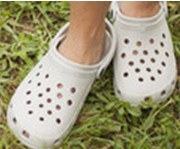Many of us wear or have worn the cheap clog-like plastic sandals. Throw them away! They are heavily polluted with carcinogenic chemicals. The ones that smell worst are the dirtiest.
That’s been found out by laboratory tests of 10 pairs of the plastic clogs in all price categories. The tests were commissioned by Germany’s biggest broadcaster, Cologne-based WDR, for its consumer service programme.
The lab looked for solvents, polycyclic aromatic hydrocarbons and heavy metals.
Polycyclic aromatic hydrocarbons (PAHs) in the footwear are substances consisting mainly of softeners and black colour particles. They’re rated as highly carcinogenic. Only four pairs examined were free of them, the other six samples contained them. The pollution was especially great in the black clogs. But it can also be in black buttons or straps. The toxic chemical can be inhaled but is also absorbed by the skin.
The clogs are light, water proof and often garishly coloured. They’re especially popular with kids and teens, but also as workwear, usually without socks in hot weather. The laboratory warned not to wear the clogs or at least to wear socks with them for some protection. Many plastics on the skin are problematical because they can contain toxins.
So far no safety levels have been set in Germany for PAHs in plastic products although scientists have demanded them for years. Industry has voluntarily set a limit of 10 mg/kg, but only for car tyres. Critical health experts are calling for a safety level of 0.2 mg/kg for plastic products.
Three years ago the German government started an initiative for an EU-wide ban of the poisonous chemicals, still being discussed in Brussels. Germany wants PAHs to be rated as “especially worrying” in the EU chemicals register REACH, which would force plastic producers to at least indicate the presence of the carcinogen in their products.
In the WDR’s laboratory tests only four of the 10 pairs were completely free of solvents. Three samples were heavily polluted, containing up to six different solvents, some of which the German authorities rate as allergens and skin irritants. Solvents can also be absorbed by the skin.
Experts see solvent residues in plastic products as an indicator of poor processing. They argue that production processes are not optimal so that solvents can’t degrade properly. As shoppers we can recognise this low quality with our noses: the plastic shoes have a sweetly pungent smell. The solvent contamination was especially great in three test samples.
The WDR asked manufacturers or dealers for comment on their findings. The US firm Crocs wrote that their products can be used risk-free and that their production methods align with European legal requirements. The US firm Skechers wrote that the girl shoes were made according to high demands and align with the REACH register. The producer of one clogs pair was not found but their wholesaler in Germany assured that they would inform their French suppliers immediately to urge that sales stop and the remaining shoes be destroyed immediately.
The price of the footwear was no reliable guide to quality. Contaminants were found in even the relatively expensive models.
Seven of the tested clogs contained heavy metals as well as solvents and PAHs. Although the metals don’t irritate the skin and can’t be absorbed by the skin, at some point the clogs finish up in the rubbish, when toxic chrome, lead and cadmium poison the environment.

